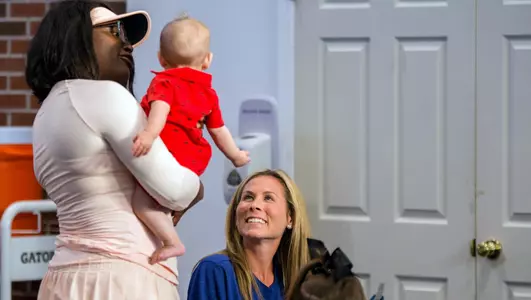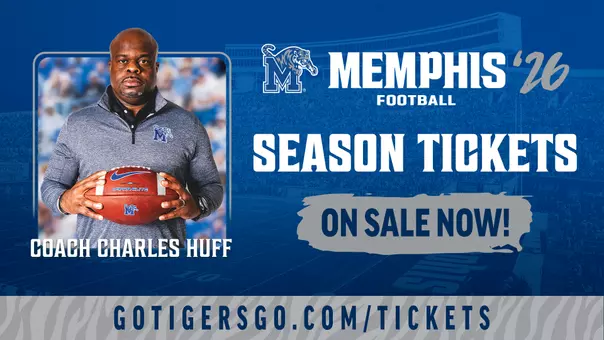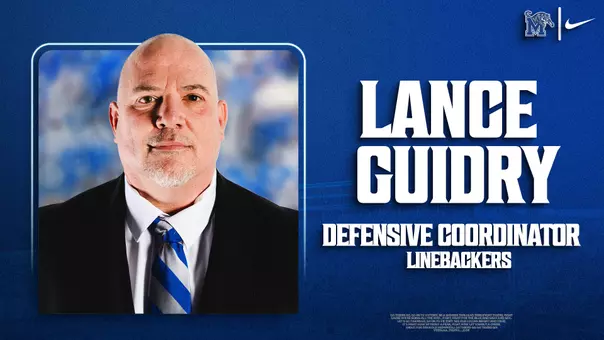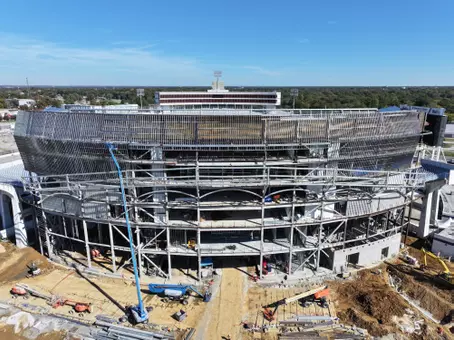University of Memphis Athletics

Photo by: Matthew Smith
We Are Family
Dec 19, 2018 | Football
Tigers Football creates family atmosphere for coaches, their families, players.
Note: The feature on the Tigers football family first appeared in the Tigers Football GameDay program Oct. 6 when Memphis hosted Connecticut.
For most of the year – particularly this time of the year – the Billy J. Murphy Athletics Complex on the University of Memphis Park Avenue Campus serves its intended purpose.
The football team trains there, eats there, lifts weights there, watches film there and practices on the complex's four outdoor fields. The atmosphere is relatively consistent. It's a place of work, a facility to make football Saturdays more enjoyable and successful.
But during the football season, there's a slice of Sunday night intended to make the place feel a bit more like home.
Third-year coach Mike Norvell invites the families of his coaching staff to join them for dinner after the team's normal Sunday walk-through following Saturday games. More is served than generous portions of meat and vegetables.
There are bonds created and bonds strengthened. Players get to see their coaches interact with their wives and families. Many of the coaches' young children get to interact with the players.
"Last year, a lot of the kids had a laser-tag tournament going on after the dinner," said Maria Norvell, coach Norvell's wife. "It's just fun to see the coaches be dads in front of the players. They get to see that part of their lives, too."
Maria said her husband allows his staff's family to come to the office to give those, especially with young children, another opportunity to see their dads. The dinners provide a relaxed setting.
Mike Norvell said the Sunday night family dinners have been a staple of the staffs on which he has been affiliated, starting when he was an assistant under Todd Graham at Tulsa. Norvell began his career in 2007 as an assistant at Tulsa and followed Graham to Pittsburgh in 2011 and Arizona State in 2012 before accepting the head coaching job at Memphis in 2016.
"When I took the job here that was something I talked to the administration about," he said. "I want to have an atmosphere where families are involved. It's so comforting for me that from (athletics director) Tom Bowen to (university president) David Rudd to our board of trustees, they all believe in that.
"That's what makes Memphis special. It's not just about the game. It's about the experience. It's about the relationships. We spend a lot of time coaching this game and impacting these players. A lot of our (assistant) coaches have families and whether it's just their wives, or their wives and kids, I want them to be a part of this experience."
Because of the demanding schedule a football staff must follow, Norvell said there "will be many nights" in which he won't be home when his daughter, Mila, goes to sleep. But he said Sunday dinners allow her to see her father's "extended family" and the people he spends his time with away from home.
"I want her to know that when she does ask her mom where her dad is, she knows we are helping the football boys, as she likes to say," Norvell said. "I want our players to see the families, to see our wives and kids. It shows that it's beyond just the game and that we are all in this together."
Players enjoy the interaction, too. They relish seeing their coaches being someone other than a coach.
"Coaches spend so much time with us that it's nice to see their families out here," said Tigers linebacker Austin Hall. "And their kids have so much fun coming out here. Sometimes you'll see their kids running on the practice fields (not in use) before our practice ends."
Defensive coordinator Chris Ball, who was on the staff with Norvell at Arizona State, said being part of a staff that emphasizes family is a blessing. It also has an impact on a group of 18-, 19- and 20-year-olds when family time is a shared experience.
"In order for you to be successful year in and year out, family has to be a priority," Ball said. "It shows players the importance of being a great husband or a great father. At the end of the day, that's what it's all about."
Sometimes, Ball said, that aspect of being a college football coach – a teacher – can get lost in the pursuit of conference championships, national rankings and upset victories over Power Five opponents.
"The great thing about coach Norvell is that he knows we are here to change lives," Ball said. "The issue with our profession today is that people are getting into it for the money. My dad was a coach, and I hear his words every day. He said coach because you want to make an impact in somebody's life. If it ever gets to be
anything else, get out of the profession. Do something else."
Ball said he can recognize when a member of his staff appears stressed while going over some game-week preparation. Ball usually tells him to take a break, leave the office, and go see his family, something that can be overlooked during what often can be an around-the-clock schedule.
"I can see it in someone's body language, I can see it in his attitude, I can see it in his coaching," Ball said. "Look, these guys were hired because they are good husbands and fathers and they want to make a difference in somebody's life. And when that doesn't line up, it affects them because they care about family."
Those breaks, and the weekly in-season family nights, are what creates a stronger program. Hall, a junior from Collierville, said seeing the coaches and their families together at the Sunday night dinners allows the players to see a "more open and caring side" of their position coaches.
Defensive line coach Paul Randolph said coaches, understandably, have a difficult time unplugging from their duties as assistants during the season. Sunday nights allow them to step back.
"We are of a one-track mind, always thinking 'next opponent, next opponent, next opponent,'" Randolph said. "We usually don't find time to eat right, if we
eat at all. This forces us to slow down for a moment and really spend time with our families.
"And you can't be the old, gruff coach in that setting. When coach Ball's daughters come running up, he's not old, mean, tough coach Ball anymore. He's dad."
Randolph said the players are learning about father-daughter relationships, about overall family relationships, and about "how to be a real man" during those get-togethers.
"I knew," Norvell said, "if I ever got the opportunity to run a program, (emphasizing family time) is something that would be important to me. Whenever
a player gets to see his coach as husband, as dad, whenever he gets to see the (other) responsibilities his coach has beyond the game of football, it's
pretty special."
For most of the year – particularly this time of the year – the Billy J. Murphy Athletics Complex on the University of Memphis Park Avenue Campus serves its intended purpose.
The football team trains there, eats there, lifts weights there, watches film there and practices on the complex's four outdoor fields. The atmosphere is relatively consistent. It's a place of work, a facility to make football Saturdays more enjoyable and successful.
But during the football season, there's a slice of Sunday night intended to make the place feel a bit more like home.
Third-year coach Mike Norvell invites the families of his coaching staff to join them for dinner after the team's normal Sunday walk-through following Saturday games. More is served than generous portions of meat and vegetables.
There are bonds created and bonds strengthened. Players get to see their coaches interact with their wives and families. Many of the coaches' young children get to interact with the players.
"Last year, a lot of the kids had a laser-tag tournament going on after the dinner," said Maria Norvell, coach Norvell's wife. "It's just fun to see the coaches be dads in front of the players. They get to see that part of their lives, too."

Maria said her husband allows his staff's family to come to the office to give those, especially with young children, another opportunity to see their dads. The dinners provide a relaxed setting.
Mike Norvell said the Sunday night family dinners have been a staple of the staffs on which he has been affiliated, starting when he was an assistant under Todd Graham at Tulsa. Norvell began his career in 2007 as an assistant at Tulsa and followed Graham to Pittsburgh in 2011 and Arizona State in 2012 before accepting the head coaching job at Memphis in 2016.
"When I took the job here that was something I talked to the administration about," he said. "I want to have an atmosphere where families are involved. It's so comforting for me that from (athletics director) Tom Bowen to (university president) David Rudd to our board of trustees, they all believe in that.
"That's what makes Memphis special. It's not just about the game. It's about the experience. It's about the relationships. We spend a lot of time coaching this game and impacting these players. A lot of our (assistant) coaches have families and whether it's just their wives, or their wives and kids, I want them to be a part of this experience."
Because of the demanding schedule a football staff must follow, Norvell said there "will be many nights" in which he won't be home when his daughter, Mila, goes to sleep. But he said Sunday dinners allow her to see her father's "extended family" and the people he spends his time with away from home.
"I want her to know that when she does ask her mom where her dad is, she knows we are helping the football boys, as she likes to say," Norvell said. "I want our players to see the families, to see our wives and kids. It shows that it's beyond just the game and that we are all in this together."
Players enjoy the interaction, too. They relish seeing their coaches being someone other than a coach.
"Coaches spend so much time with us that it's nice to see their families out here," said Tigers linebacker Austin Hall. "And their kids have so much fun coming out here. Sometimes you'll see their kids running on the practice fields (not in use) before our practice ends."
Defensive coordinator Chris Ball, who was on the staff with Norvell at Arizona State, said being part of a staff that emphasizes family is a blessing. It also has an impact on a group of 18-, 19- and 20-year-olds when family time is a shared experience.
"In order for you to be successful year in and year out, family has to be a priority," Ball said. "It shows players the importance of being a great husband or a great father. At the end of the day, that's what it's all about."
Sometimes, Ball said, that aspect of being a college football coach – a teacher – can get lost in the pursuit of conference championships, national rankings and upset victories over Power Five opponents.
"The great thing about coach Norvell is that he knows we are here to change lives," Ball said. "The issue with our profession today is that people are getting into it for the money. My dad was a coach, and I hear his words every day. He said coach because you want to make an impact in somebody's life. If it ever gets to be
anything else, get out of the profession. Do something else."
Ball said he can recognize when a member of his staff appears stressed while going over some game-week preparation. Ball usually tells him to take a break, leave the office, and go see his family, something that can be overlooked during what often can be an around-the-clock schedule.
"I can see it in someone's body language, I can see it in his attitude, I can see it in his coaching," Ball said. "Look, these guys were hired because they are good husbands and fathers and they want to make a difference in somebody's life. And when that doesn't line up, it affects them because they care about family."
Those breaks, and the weekly in-season family nights, are what creates a stronger program. Hall, a junior from Collierville, said seeing the coaches and their families together at the Sunday night dinners allows the players to see a "more open and caring side" of their position coaches.
Defensive line coach Paul Randolph said coaches, understandably, have a difficult time unplugging from their duties as assistants during the season. Sunday nights allow them to step back.
"We are of a one-track mind, always thinking 'next opponent, next opponent, next opponent,'" Randolph said. "We usually don't find time to eat right, if we
eat at all. This forces us to slow down for a moment and really spend time with our families.
"And you can't be the old, gruff coach in that setting. When coach Ball's daughters come running up, he's not old, mean, tough coach Ball anymore. He's dad."
Randolph said the players are learning about father-daughter relationships, about overall family relationships, and about "how to be a real man" during those get-togethers.
"I knew," Norvell said, "if I ever got the opportunity to run a program, (emphasizing family time) is something that would be important to me. Whenever
a player gets to see his coach as husband, as dad, whenever he gets to see the (other) responsibilities his coach has beyond the game of football, it's
pretty special."
Players Mentioned
Football: Charles Huff Press Conference-February 4, 2026
Wednesday, February 04
Football: 2025 Gasparilla Bowl Postgame Press Conference
Friday, December 19
Football: Reggie Howard Press Conference - December 16, 2025
Tuesday, December 16
Football: Jeff Brightwell One on One with Charles Huff-December 12, 2025
Friday, December 12





